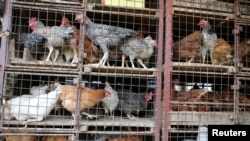The U.N. Food and Agriculture Organization has called an emergency meeting this Wednesday in South Africa of all countries in the Southern Africa Development Community (SADC) following an outbreak of highly pathogenic avian influenza (HPAI). Aid workers are concerned what this could mean for food security in the region, where a fall armyworm invasion and drought have decimated crops in recent years.
The U.N. Food and Agriculture Organization (FAO) says besides Zimbabwe, the other countries in the region hit by the avian influenza outbreak are the Democratic Republic of Congo and South Africa.
While officials haven’t released figures for the numbers of birds affected, the FAO said the outbreak is currently concentrated in one province of Zimbabwe and three in South Africa. Earlier this year, the FAO issued a warning to the SADC regional bloc, after the virus was detected in the Lake Victoria area in East Africa.
David Phiri, the head of FAO in Southern Africa, told VOA it is urgent to contain the outbreak.
“Avian influenza is a trans-boundary pest and disease, and it can move from one country to another, from one site to another. So there is a possibility, very easily that it could spread in those particular countries or even beyond the borders. For this reason, we need to control it and to also ensure that there is also prevention measures – both by the countries affected and other countries that have not been affected…."
"Poultry is what a lot of families depend on for protein. It is the cheapest protein. It [The outbreak] is also coming in the backdrop of two years of heavy droughts, last being affected by El Nino. That was a disaster itself for the sub-region. More recently, we have had an outbreak of fall armyworm which has affected some farmers very, very badly. So we cannot afford another very serious outbreak that could reduce food security and livelihoods in the sub-region,” he said.
Dr. Unesu Ushewokunze-Obatolu, chief veterinary officer of the Zimbabwe Ministry of Agriculture, has this advice for farmers.
“Just make sure that birds that are produced do not have contact with anything from outside that is not well-managed. Sometimes in traditional systems, people receive poultry as gifts and they put it among the poultry that they are having at home. That is very dangerous. Normally, some of these viruses can cause diseases in people, but this one is a bit different. That gives a bit of joy, but it is not easy to deal with because it spreads very quickly and it kills birds. So those doing businesses with high numbers of birds are very, very susceptible,” said Obatolu.
In recent years, African countries have responded to avian flu outbreaks by closing their borders to poultry imports and culling large numbers of exposed birds.





